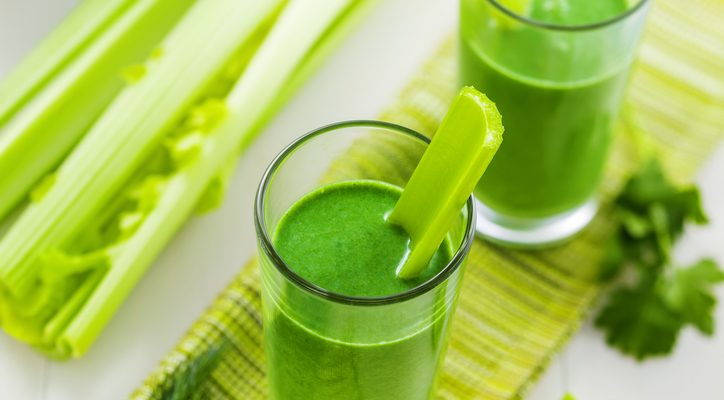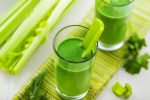
Celery juice is one of the most nutritious foods that we can put into the body. We will examine many of the fascinating celery nutrition facts that make this juice so good for you. For example, the nutrition in celery juice will help alkalize and hydrate the body, and improve your overall health.
In ancient times, celery was first used as a medicinal herb, and later as a food. Celery is also known by the scientific name Apium graveolens and is a vegetable from the plant family Apiaceae.
The medicinal properties of celery appeared in the famous epic The Odyssey from Greek poet Homer in the 9th century B.C. The ancient Romans first used celery as a food seasoning due to its distinct aromatic flavor.
Today, raw celery is often used in salad or as a flavor enhancer in soups and stews. That being said, it is also an excellent ingredient for juicing.
Celery Nutrition Facts
Celery juice benefits stem from the nutrition content in celery. Celery health benefits are due to its good quality of vitamins and minerals. For instance, celery is an excellent source of vitamin K and vitamin C.
Celery is also a good source of vitamin A, vitamin E, vitamin B1, vitamin B2, vitamin B3, vitamin B5, vitamin 6, folate, choline, and betaine. From a mineral perspective, celery is a good source of calcium, copper, iron, manganese, molybdenum, selenium, zinc, and electrolytes like magnesium, potassium, and phosphorus. Celery is also a small source of protein, carbs, and fiber.
Let’s take a look at some celery nutrition facts in more detail. The following is a comprehensive celery nutrition chart that contains credible information for one cup of celery.
| Nutrient | Amount | Daily Value |
|---|---|---|
| Calories | 17.6 | 1.00% |
| Carbohydrates | 3.8g | 7.00% |
| Fiber | 1.8g | 7.00% |
| Protein | 0.8g | 2.00% |
| Total Fat | 0.2g | 0.00% |
| Iron | 0.2mg | 1.00% |
| Manganese | 0.1mg | 6.00% |
| Calcium | 44mg | 4.00% |
| Copper | 0.04mg | 2.00% |
| Magnesium | 12.1mg | 3.00% |
| Phosphorus | 26.4mg | 3.00% |
| Potassium | 286mg | 8.00% |
| Zinc | 0.1mg | 1.00% |
| Selenium | 0.4mcg | 1.00% |
| Molybdenum | 6.0mcg | 8.00% |
| Vitamin A | 494IU | 10.00% |
| Vitamin C | 3.4mg | 6.00% |
| Vitamin E | 0.3mg | 1.00% |
| Vitamin K | 32.2mcg | 40.00% |
| Vitamin B1 | 0.06mg | 4.00% |
| Vitamin B2 | 0.1mg | 4.00% |
| Vitamin B3 | 0.3mg | 2.00% |
| Folate | 39.6mcg | 10.00% |
| Vitamin B5 | 0.3mg | 3.00% |
| Vitamin B6 | 0.1mg | 4.00% |
| Choline | 6.7mg | N/A |
| Betaine | 0.1mg | N/A |
* N/A—Not Applicable
10 Benefits of Celery Juice
The benefits of celery juice are seemingly endless. That is because celery is packed full of nutrition. Celery’s high water and electrolyte content can help prevent dehydration, while special compounds in the food help it act as a diuretic.
The polyphenol phytonutrients and antioxidant flavonoids also help to improve eye, skin, liver, and cognitive health. The following are 10 key health benefits of celery and celery juice.
1. May Prevent Cancer
Celery is in the same family as fennel, parsley, parsnips, and carrots, which all contain chemo-protective compounds called polyacetylenes. Studies have found that polyacetylenes help decrease toxicity and fight cancer, and more specifically intestinal cancer, breast cancer, and leukemia.
In a study published in the Journal of Agricultural and Food Chemistry in 2009, polyacetylenes would show antitumor activity, anti-inflammatory, cytotoxic, and antiplatelet-aggregatory activity.
2. Prevents Urinary Tract Infections
Celery will reduce uric acid and stimulates urine production. As a result, celery is beneficial for fighting bacterial infections within reproductive organs and the digestive tract. This means celery can help prevent:
- Urinary tract infections
- Kidney problems
- Bladder disorders
- Cysts on reproductive organs.
3. Benefits Weight Loss
Celery is low in calories, and as a result, it can be extremely valuable for a weight loss program. It does this by providing the body with vital nutrients and also regulating fat metabolism.
4. Improves Digestion
Celery seeds contain an oily and odorless compound called NBP that not only has a diuretic effect, but also helps the body detox. The digestive benefits of celery are partly due to this diuretic effect. Circulation is improved in the intestines; therefore, celery improves digestion through relief of bloating and puffiness from water retention.
5. Fights Infections
In a study published in the Journal of Pharmacy and Pharmacology in 2009, researchers found that there are anti-microbial properties in celery. The study found that the celery extract would significantly purify and decrease the bacteria’s growth. This suggests that celery can fight bacterial infections and boost the immune system.
6. Lowers High Cholesterol
Celery contains a unique compound called 3-n-butylphthalide (BuPh) that has been reported for its lipid-lowering mechanism. In a 1995 study published in the journal Planta Medica, rats fed a high-fat diet for eight weeks that were also given celery extract would show significantly lower lipid levels than those that didn’t receive celery extract. The celery extract group also experienced reductions in triglycerides, LDL (low density lipoprotein) cholesterol, and total cholesterol.
7. Treats and Prevents High Blood Pressure
The anti-hypertensive properties of celery seed extracts help decrease high blood pressure. Celery seeds contain aqueous-ethanolic, methanolic, and hexanic extracts that help control blood pressure.
In a study published in the Journal of Medicinal Food in 2013, rats given celery seed extract would experience significant blood pressure improvements when compared to rats not given celery extract. The potassium and calcium in celery are thought to reduce high blood pressure.
8. Reduces Inflammation
The antioxidants and polysaccharides in celery act as anti-inflammatories, especially the polyphenol and flavonoid antioxidants. This is good news because inflammation is often a major cause of cancer, arthritis, and other chronic diseases.
Some of the anti-inflammatory antioxidants in celery include flavanonoids like quercetin and phenolic acids like ferulic acid and caffeic acid. As a result, celery can reduce inflammatory conditions like gout, arthritis, and skin disorders.
9. Important for Liver Health
In a study published in Pharmacognosy Magazine in 2011, researchers observed an improvement in blood lipid levels and liver enzyme function in rats fed a high-cholesterol diet were also given chicory, barley powder, and celery.
The more barley, chicory, and celery were given, the better their liver health improved. This suggests that a diet high in celery can benefit those with liver disease.
10. Helpful for Ulcer Prevention
Celery can also help prevent or reduce ulcer formation. A study published in the journal Pharmaceutical Biology in 2010 found that celery contains a special type of ethanol extract that helps protects the lining of the digestive tract against ulcers.
The researchers believe celery nourishes the colon, intestines, and stomach due to its tannins, flavonoids, alkaloids, and volatile oils.
Celery Juice Recipes
In general, celery juice makes for a great post-workout recovery drink. The following are celery juice recipes that are easy and fun to make.
The recipe directions are very straightforward. Basically, you will wash and cut up the vegetables in bite-sized pieces to fit the juicer and stir in other ingredients like coconut water separately. It is always best to consume your fresh juice immediately; however, if necessary, you can leave it in the fridge and drink it later that day.
1. Super Hydration Celery Juice
The combination of celery, cucumber, lime, and coconut water is the perfect blend of electrolytes and other beneficial nutrients. This recipe will only take about five minutes to make as well.
Ingredients:
- 4 oz. of coconut water
- 4 celery stalks
- 1 cucumber
- 1 lime
Directions:
After you have juiced the vegetables, stir in the coconut water, and consume right away.
2. The Celery and Fennel Juice
Fennel, carrots, and celery are all from the same family. In this celery juice recipe, all three ingredients go together quite well. For more antioxidants, try adding garlic to the recipe.
Ingredients:
- 4 celery stalks
- 2 carrots
- 1/4 fresh fennel bulb
- 1/2 tsp. of ground cumin
Directions:
In a juicer, process the fennel, carrots, and celery. Whisk and pour into a glass, and stir in the cumin.
3. The Gallstone Celery Juice
As the name implies, this celery juice is perfect as a gallstone treatment.
Ingredients:
- 3 tomatoes
- 2 celery stalks
- 2 carrots
- 1 handful of watercress
- 4 radishes
- 2 fresh parsley sprigs
- 1/2 lemon
Directions:
In a juicer combine tomatoes, celery, carrots, radishes, watercress, lemon, and parsley. Whisk and pour the juice into a glass.
Using celery for juicing is always a good idea. That is because there are a lot of good cardiovascular, digestive, and other benefits of celery that cannot be ignored. However, in some cases people may be allergic to celery.
It is also important to keep in mind that when picking out celery, the stalks are firm and not too limber. Also, don’t wash celery too quickly after brining it home because it can go bad. Celery will store well in the refrigerator for five to seven days. After that, celery will get limp and its nutrient content will begin to decrease.
Sources:
Mateljan, G., The World’s Healthiest Foods: Essential Guide for the healthiest way of eating (Seattle: George Mateljan Foundation, 2007), 202-209.
Walters, S., “The Incredible Powers of Celery Juice,” Natural News website, Oct. 24, 2008; http://www.naturalnews.com/024596_celery_juicing.html.
“Celery, raw nutrition facts & calories,” SELFNutritionData website; http://nutritiondata.self.com/facts/vegetables-and-vegetable-products/2396/2, last accessed Jan. 23, 2017.
“7 Surprising Celery Juice Benefits for Your Body,” Health Ambition website; https://www.healthambition.com/celery-juice-benefits/, last accessed Jan. 23, 2017.
















